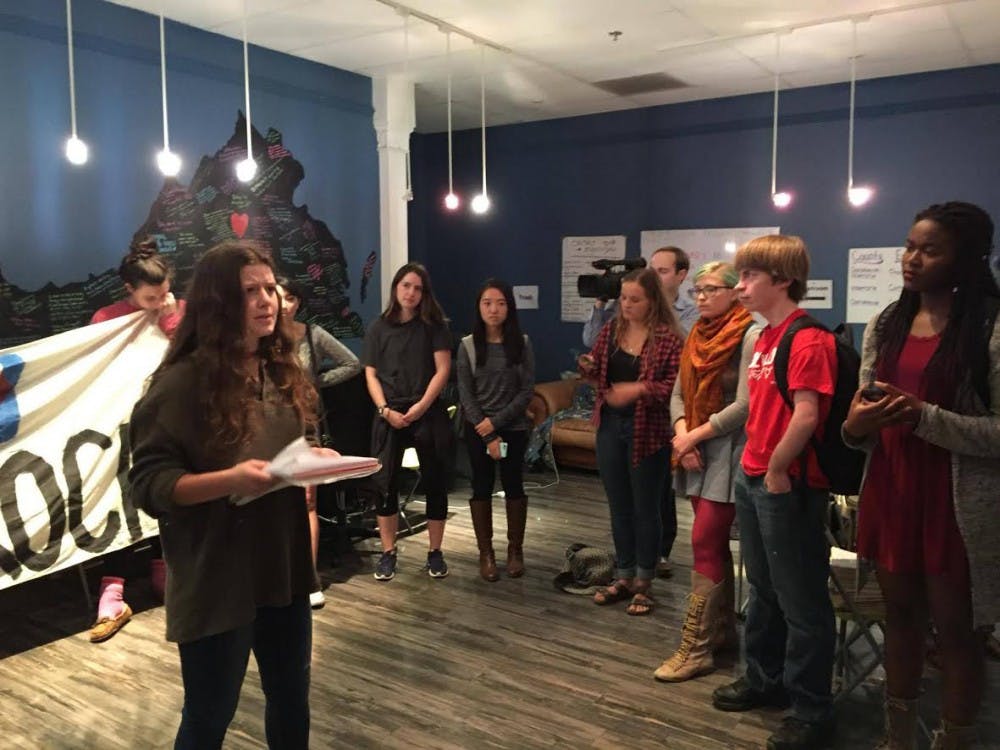More than two dozen University students gathered at the Hillary Clinton campaign office on the Downtown Mall Oct. 28 to request that the Democratic presidential candidate oppose the Dakota Access Pipeline.
The pipeline is a crude oil pipeline that runs from North Dakota to Illinois through South Dakota and Iowa and through the Missouri River.
If construction plans are not altered, it will run within a half-mile of Standing Rock Sioux tribe reservation land.
Opponents of the pipeline argue it will damage sacred land and historic and cultural resources.
Energy Transfer Partners, however, says the pipeline is part of a transportation network needed to support growing levels of energy production and received construction approval from the United States Army Corps of Engineers.
The USACE, the Department of Justice, the Department of the Army and the Department of the Interior have requested a halt to the construction until they have reviewed the pipeline’s compliance with federal laws.
“The Army is exploring a range of options that take into account concerns raised by the relevant stakeholders and will decide the best path to move forward,” Eugene Pawlik, USACE Public Affairs Office press liaison, said. There is no set timeline for this process.
Pawlik was unable to provide more specific comment due to ongoing litigation.
The University students’ demonstration came after Standing Rock Sioux youth in Brooklyn, N.Y., occupied the Clinton campaign headquarters. The Brooklyn demonstrators had presented a letter with their requests for the campaign to oppose pipeline construction, but the office did not accept it.
Brooklyn demonstrators requested that the candidate protect the Missouri River, the reservation’s only source of water. They also asked that Clinton halt construction through closeby Sioux prayer sites.
“They refused to take their letter, so that made me really mad,” Laura Cross, a member of the Virginia Student Environmental Coalition and a third-year College student, said.
VSEC organized a peaceful demonstration one hour after a call for global solidarity from the Brooklyn Standing Rock Sioux.
Xochitl Hinojosa, Clinton campaign director of coalitions, acknowledged that the national campaign headquarters received a letter from protesting tribes’ representatives.
“Now, all of the parties involved — including the federal government, the pipeline company and contractors, the state of North Dakota and the tribes — need to find a path forward that serves the broadest public interest,” Hinojosa said.
During the Charlottesville protest, there was limited interaction between Clinton campaign office employees and student demonstrators. One worker politely told the students they needed to return to work.
“We weren’t chanting at [the Clinton campaign employees], because it’s not about the people who work there, obviously,” Cross said. “What we were doing was following the leadership of those [Brooklyn Standing Rock Sioux] young people that had done this the day before.”
Students from Virginia Tech, Virginia Commonwealth University and the University of Mary Washington hosted similar demonstrations at their respective Clinton campaign offices.
When asked why a demonstration was not also held at the local Trump campaign office, Cross said students were “following the lead of the Standing Rock Sioux and that was the example they set … in that respect.”
Third-year College student Evelyn Immonen, chief financial officer of the Native American Student Union who has family from Standing Rock, said she is supporting the protest efforts.
NASU has previously issued a statement in support of the Standing Rock Sioux and helped organize a protest on the Charlottesville Downtown Mall.
Immonen said though social media actions are beneficial for spreading awareness, there are tangible needs in Standing Rock that supporters can meet, like monetary donations for food, a legal fund to bail demonstrators out of jail and, as temperatures cool, for heating supplies.
“[NASU] stands in solidarity with the water protectors,” Immonen said. “They’ve always been a part of this land, and we stand in solidarity with all of the demonstrations that are going on. NASU … condemns the human rights violations that are going on, because it’s a humanitarian issue.”
Immonen noted her personal attachment to the protests.
“It’s an issue that’s really important to me,” Immonen said. “It’s spiritually important to a lot of people. This is the first time that the Great Sioux Nation has united in over a hundred years.”
Kelcy Warren, chairman and chief executive officer of ETP, said in an internal memo that the company, along with USACE, has spoken extensively with tribes about the pipeline. He also said the pipeline will not threaten water quality.
ETP did not return a request for comment.







